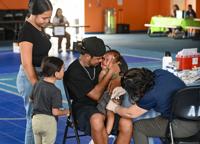Health
Guam Summit Tackles Mental Health Crisis and Homelessness

A recent summit in Guam focused on the alarming state of mental health and homelessness on the island, highlighting the challenges faced by both individuals and service providers. The event, organized by the Guam Homeless Coalition, took place on March 15, 2024, at the University of Guam and addressed pressing issues surrounding mental health services and support for the homeless population.
Since the introduction of the 988 Lifeline in 2022, Guam has recorded over 30,000 crisis interactions, according to project coordinator Jesse Libby. This statistic underscores a significant public health concern, as it indicates that approximately one in five residents may experience a mental health crisis at some point in their lives. Libby emphasized the distressing reality of high suicide rates in the community, stating, “Guam statistically has high rates of suicide and suicide disproportionately affects people mostly in our community.”
Addressing Limited Resources
During the summit, Libby pointed out the limited resources available for mental health support, saying, “The reality is that the need is out there and the resources out there are incredibly limited.” He highlighted the difficulty in referring individuals in need of shelter to facilities that are often at capacity, reflecting a broader issue of resource allocation in mental health services.
The theme of the summit, “Navigating homelessness and services amid shifting policy currents,” provided a framework for discussions on how to better serve those experiencing homelessness, many of whom rely on the 988 Lifeline and the Mobile Crisis Response Team (MCRT). According to MCRT supervisor Mark Torre Jr., the team plays a crucial role in addressing mental health crises while reducing the reliance on police interventions. “Typically, when you’re in a crisis or an emergency, what number do we call? 911. That’s not wrong; however, there’s now another option, there’s 988,” Torre explained.
The MCRT, which operates from 7 a.m. to 11:30 p.m., has adjusted its hours to meet community demand, providing two to four team members per shift. Torre reported that 75% of MCRT activations led to successful de-escalations, with 62% of cases related to mental health crises and 34% involving suicidal or homicidal thoughts. Notably, 30% of interventions were attributed to non-compliance with medications, illustrating the complexities of mental health challenges on the island.
Bridging Service Gaps
The summit also highlighted significant gaps in mental health services, particularly the absence of dementia care facilities on the island. Dr. Carla T. Haddock from the Guam Behavioral Health and Wellness Center noted that the lack of such centers exacerbates the challenges faced by individuals with Alzheimer’s or dementia, conditions that can resemble mental health disorders. “That is really, truly a gap in service on this island,” she remarked.
Additionally, the voluntary and involuntary admissions process for individuals experiencing mental health crises was discussed, particularly in light of new legislation. A recent bill introduced by Sen. Shelly Calvo, known as Bill 219-38, aims to modify and expand the Assisted Outpatient Treatment requirements, potentially improving access to care for those in need.
Efforts to improve access for the homeless population were also a focal point. Alyssa Roberto, project director for the Guam Systems of Care, explained that lead providers are tasked with meeting individuals where they are, often visiting frequented locations and providing transportation assistance through bus passes. The Guam Systems of Care operates 24/7, ensuring that support is readily available for those in crisis.
As Guam continues to grapple with high rates of suicide and the complexities of mental health crises, the discussions at this summit underscore the urgent need for comprehensive services and community support. New initiatives and legislative efforts may pave the way for better outcomes, but significant challenges remain in addressing the mental health and homelessness crisis on the island.
-

 Science1 month ago
Science1 month agoIROS 2025 to Showcase Cutting-Edge Robotics Innovations in China
-

 Science2 weeks ago
Science2 weeks agoUniversity of Hawaiʻi at Mānoa Joins $25.6M AI Initiative for Disaster Monitoring
-

 Lifestyle1 month ago
Lifestyle1 month agoStone Island’s Logo Worn by Extremists Sparks Brand Dilemma
-

 Health1 month ago
Health1 month agoStartup Liberate Bio Secures $31 Million for Next-Gen Therapies
-

 World1 month ago
World1 month agoBravo Company Veterans Honored with Bronze Medals After 56 Years
-

 Politics1 month ago
Politics1 month agoJudge Considers Dismissal of Chelsea Housing Case Citing AI Flaws
-

 Lifestyle1 month ago
Lifestyle1 month agoMary Morgan Jackson Crowned Little Miss National Peanut Festival 2025
-

 Health1 month ago
Health1 month agoTop Hyaluronic Acid Serums for Radiant Skin in 2025
-

 Science1 month ago
Science1 month agoArizona State University Transforms Programming Education Approach
-

 Top Stories1 month ago
Top Stories1 month agoIndonesia Suspends 27,000 Bank Accounts in Online Gambling Crackdown
-

 Sports1 month ago
Sports1 month agoMel Kiper Jr. Reveals Top 25 Prospects for 2026 NFL Draft
-

 Business1 month ago
Business1 month agoTruist Financial Increases Stake in Global X Variable Rate ETF








